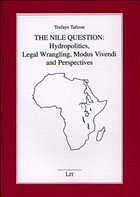Nicht lieferbar

The Nile Question: Hydropolitics, Legal Wrangling, Modus Vivendi and Perspectives
Versandkostenfrei!
Nicht lieferbar
I recommend Dr. Tafesse's book to all readers who wish to understand the hydropolitical intricacies, legal debates and cooperative endeavors that have enveloped the Nile Basin. His comparative analysis with some other transboundary river basins in the Third World also makes the book relevant and worth reading to others who have an interest in water geopolitics.



